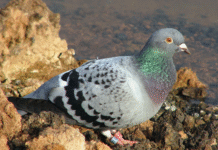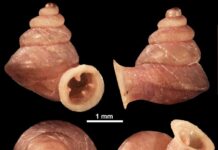
BY JOSEPH MASILAMANY
PETALING JAYA: Malaysian science journalist, Dr Mahaletchumy Arujanan was overwhelmed by mixed feelings when informed of her new role as global coordinator for the International Service for the Acquisition of Agri-biotech Applications (ISAAA).
Describing her as a world renowned science communicator, ISAAA’s news portal Crop Biotech Update announced the appointment on May 2.
In an immediate reaction to the announcement, Mahaletchumy popularly known as Maha in her social and professional circles told The Petri Dish that she is excited, happy and nervous at the same time – being mindful of the daunting challenges and the positive pressures that come with the position.
“I received many messages from stakeholders around the world, from the different government agencies, industry players, international organisations and scientists, putting so much of hope in me after the announcement was made.
“I will have to live up to their expectations. It will not be easy. But I am going to give my fullest, just like what I did all this while in all my other roles.
“I am also glad that the ISAAA board and my colleagues around the globe have assured me of their support,” said Maha who is also the executive director of the Malaysian Biotechnology Information Centre (Mabic) – part of an ISAAA-sponsored network across
the world.
She further says: “The position of global coordinator of ISAAA is really a hot seat. I am taking over the void left behind by the late Dr Randy Hautea. Indeed, I have big shoes to fill.
“Randy was very diplomatic as this role involves cultural and political sensitivity around the globe. Randy was liked and respected by the international agribiotech community. It is not easy to gain the trust and respect from a heterogenous international community, especially when our work courts polarised views and debates. And Randy was a natural for the job,” says Maha.
Asked on the choice of a Malaysian for the position, she says: “I am very proud that a Malaysian has been chosen to helm the international organisation which is most cited in the field of agribiotechnology.

Challenging
“I am taking on this position at the time when ‘precision breeding technology’ is changing the landscape of biosafety regulations, the demography of the industry players and consumers’ perception. I am expecting a challenging yet an exciting time ahead.”
Maha, who is also an international consultant to the Food and Agriculture Organisation in Sri Lanka, says, agribiotechnology has evolved from conventional breeding to genetic modifications and now new breeding or precision breeding technologies.
“Many are opposed to these technologies due to the ideology that everything must remain ‘natural’. Other reasons for the opposition are the peddling of pseudoscience, negative views by the world media and scaremongering strategies by critics of modern biotechnology.”
She also pointed out that many countries lack political will to advance in this field, causing adoption and approval of biotech crops to be ignored.
On another note, she says authorities lack technical knowledge on the legal instruments and risk assessments that delay adoption and acceptance of biotech crops – causing trade disruption, so much so, many industries like farming and livestock breeding suffer from the impact.
“Even in Malaysia, scientists have given up working on GMOs due to the tedious and almost unrealistic requirements set in our guidelines and regulations. It is a loss of opportunity to meet food security, mitigate climate change, embrace sustainable development and develop value-added products for industrial and pharmaceutical uses,” she says.
Go-getter
Known as a formidable “go-getter”, Maha has engaged in challenging feats in many areas that are passionate to her.
Among her pet areas of debate and discussion, especially during international engagements at the podium are; the need for proper science communications, acceptance of genetically modified techniques, adoption of nuclear energy, R & D priorities and funding mechanisms, emphasis on science, technology, engineering and mathematics (STEM) in schools and universities, research and commercialisation as well as empowerment of women in the science sector.
Active hub
In 2003, when she first helmed Mabic and getting little support from local editors on science news, she engaged with a mainstream journalist and went on to establish The Petri Dish – a monthly regional publication, so that science stories could grab the headlines. And now, propelled by her own media tool in hand she penned fiery editorials, often causing her editor to scramble for more placid words to dilute her ireful tone.
The Petri Dish is now in its eighth year of publication, and is still put together by just four individuals, having weathered many challenges, especially in the area of funding.
Maha is also instrumental in transforming Mabic into an active hub that plays a regional role beyond the shores of Malaysia.
She says: “We created revenue streams at Mabic so that we are not totally dependent on ISAAA’s core funding. Fund raising is a tiring task and I believe in managing Mabic as a social enterprise where we offer value-added services that stakeholders are seeking.
“One of my mission as global coordinator will be to transform other Biotechnology Information Centres (BICs) around the world as well, so they too become partially self-sufficient to continue ISAAA’s universal mission, says Maha, who will continue to head Mabic.
Maha holds a BS degree in microbiology and biochemistry, an MS in biotechnology, and PhD in science communication from the University of Malaya.
She has been with ISAAA through Mabic in the last 16 years and has been a strong advocate of biotechnology, building capacities and forming networks in different countries all over the world.
This includes hosting international dialogue sessions between scientists and Islamic scholars that resulted in a resolution that GMOs are halal (not forbidden) and that Muslims must support modern biotechnology to ensure food security among the ummah (Muslim faithful). This Mabic initiative is now a “global reference point” for Muslim nations on the issue.
Larger than life
Maha’s string of achievements reads “larger-than-life” of her own dauntless persona.
In 2010, she won the “The World Academy of Sciences Regional Prize for Public Understanding of Science for East and Southeast Asia and the Pacific region”.
In 2015, Scientific American’s World View named her as one of “the 100 most influential persons in biotech in the world”.
In the same year, Biotech Law Report published by Mary Ann Liebert in the USA listed Maha as “one of the women” in Biotech Law and Regulations.
In the same year, Malaysian Women’s Weekly also listed her as one of the “Great Women of our Time” in its December issue.
Maha also developed the first structured science communication module that is being offered to scientists and post-graduate students.
Another accomplishment was establishing the first Asian short course on agribiotechnology, biosafety regulations and communication.
This is the first such programme in this region to build “institutional memory” in these areas in Asia.
“I have been with ISAAA since January 2003 and it has helped me to find my identity and purpose, just like how ISAAA has changed the lifestyle of millions of farmers in developing countries.
“Many farmers built proper houses and sent their children to schools and colleges after adopting modern biotechnology and biotech crops.
This is the mission we share to make the planet greener while giving the socio-economic benefits to the poorest who feed us and ensuring food security,” she told Crop Biotech Update.

Hands-on multitasker
Given her broad role, Maha keeps a packed travel schedule. She was recently featured in the cover of Malaysia Airlines inflight magazine Going Places where she told the interviewer that she makes at least ten overseas trips per year, not to mention the domestic sojourns for conferences, seminars and speaking engagements.
So how does this mother of two manage her time as a global professional, wife and mother of two and even read her PhD in 2008 when her career was just picking up and her daughters were 8 and 9.
She tells Going Places: “I have learnt how to manage my time over the years, and modern technology helped a lot too.
“While abroad, I could still help my daughters with their homework via Skype!”
Maha was also quoted by the magazine as saying: “Half the world is made up of women; think how much they could contribute with their talent?”.
Certainly, Maha seems to have what it takes to be a woman of science, a woman of steel and a woman of silk.
In her new role, there will be plenty more to accomplish and more “going places” as ISAAA’s globe-trotting emissary on a mission.
The “branded calf” in Maha is ready to go.
















